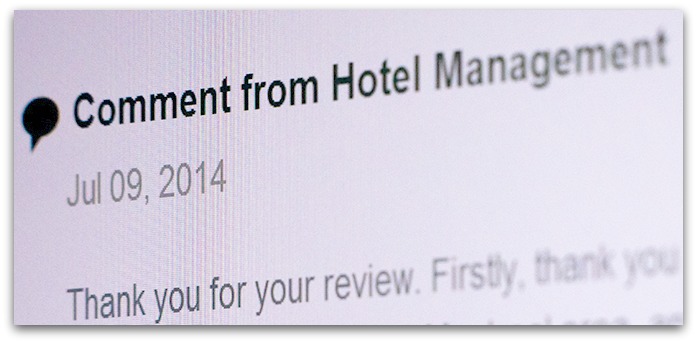Easily Improve Your Online Reputation
 Improve your online reputation by tackling review sites head on. With these tips, any industry -- from retail to service to hospitality, can effectively manage both positive and negative reviews. Four out of five people use online review sites to decide what product or service to purchase. At Thin Pig Media, we specialize in providing best practices and advice to hoteliers, but these do's and dont's will keep any brand reputation looking good online. From TripAdvisor to Expedia or Facebook and Google+, here's what to keep in mind:
DO: Respond in a personable manner.
Just as if you were speaking with a client in person, write in a friendly, upbeat manner (even if you are not a friendly, upbeat person -- channel your inner cheerleader). This lets reviewers and potential clients know that someone cares. The use of first names can build rapport. Make sure to respond with a voice that matches your brand. If your brand caters to businesses and business people, keep responses professional and concise. If your brand happens to be a resort hotel people flock to for vacation, consider using a more laid-back tone.
Improve your online reputation by tackling review sites head on. With these tips, any industry -- from retail to service to hospitality, can effectively manage both positive and negative reviews. Four out of five people use online review sites to decide what product or service to purchase. At Thin Pig Media, we specialize in providing best practices and advice to hoteliers, but these do's and dont's will keep any brand reputation looking good online. From TripAdvisor to Expedia or Facebook and Google+, here's what to keep in mind:
DO: Respond in a personable manner.
Just as if you were speaking with a client in person, write in a friendly, upbeat manner (even if you are not a friendly, upbeat person -- channel your inner cheerleader). This lets reviewers and potential clients know that someone cares. The use of first names can build rapport. Make sure to respond with a voice that matches your brand. If your brand caters to businesses and business people, keep responses professional and concise. If your brand happens to be a resort hotel people flock to for vacation, consider using a more laid-back tone.
DON’T: Canned responses won't cut it. For a hotel, guests will have plenty of things to say from the number of pillows to the water pressure in the shower. No spreadsheet of prepared responses can cover every situation. A unique response for each guest shows that someone is listening and cares. A blanket response on the other hand shows indifference to the customer's needs.
DO: Respond to negative reviews. At some point, there will be a one or two-star review. Responding to these negative reviews is an effective marketing tool. Studies show that a good response to negative feedback can increase a new customer’s intent to purchase, and reduce the impact of a critical review. Acknowledge the reviewer’s complaints, and let them know you’re sorry their experience did not meet their expectations. Keep in mind that an apology does not mean you agree with them; you are showing empathy.
DON’T: Add fuel to the fire. Negative reviews can hurt, especially if you’re passionate about your brand reputation. Try not to get defensive or critical of the reviewer. In doing so, you run the risk of antagonizing them into further damaging dialogue. A combative response is detrimental to your online reputation. Take a day before your response to think things through. Some reviewers are unhappy no matter what, so acknowledge them in a positive manner and move on.
DO: Express gratitude for all feedback. Always thank the reviewer for taking the time to share an online review. Above all, a “thank you” shows customers that you are listening. It helps to illustrate your openness and commitment to improvement. Those in favor of your brand will see that you appreciate their business. This also lets potential customers know that you take feedback seriously and have strong customer service skills.
DON’T: Underestimate your customer base. One of the worst things you can do to your online reputation is “astroturfing.” This is the name for fake positive reviews to combat real negative ones. If they aren't caught by spam filters or site moderators, your fake reviews can catch the attention of savvy readers who will no doubt spread the word of your shady tactics.
Make online reputation management a priority. Add it to your brand marketing responsibilities because when it comes down to it -- you aren't as much speaking to the reviewer as you are to potential customers that will read the review *and your response* before making their purchase decision.

